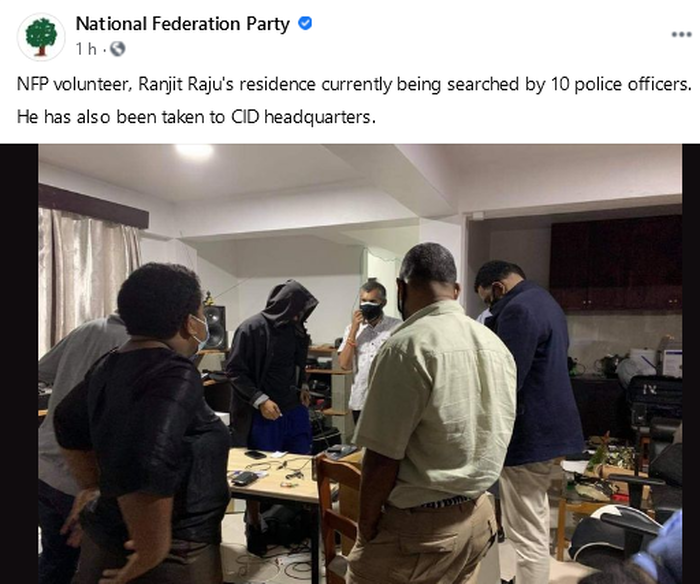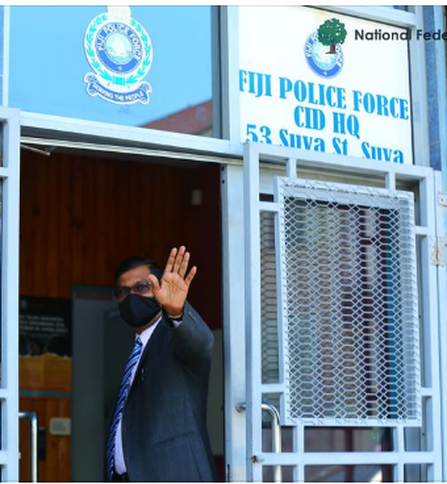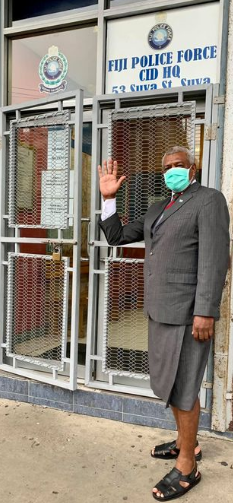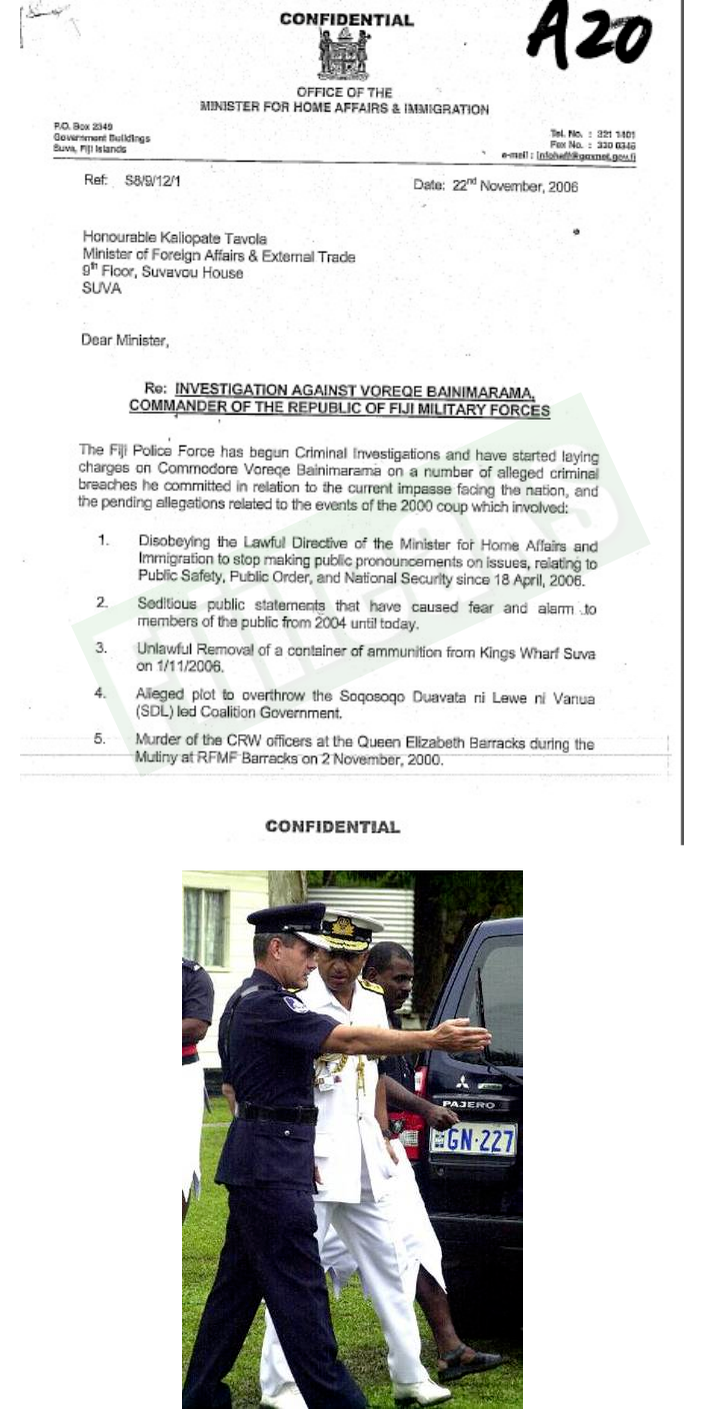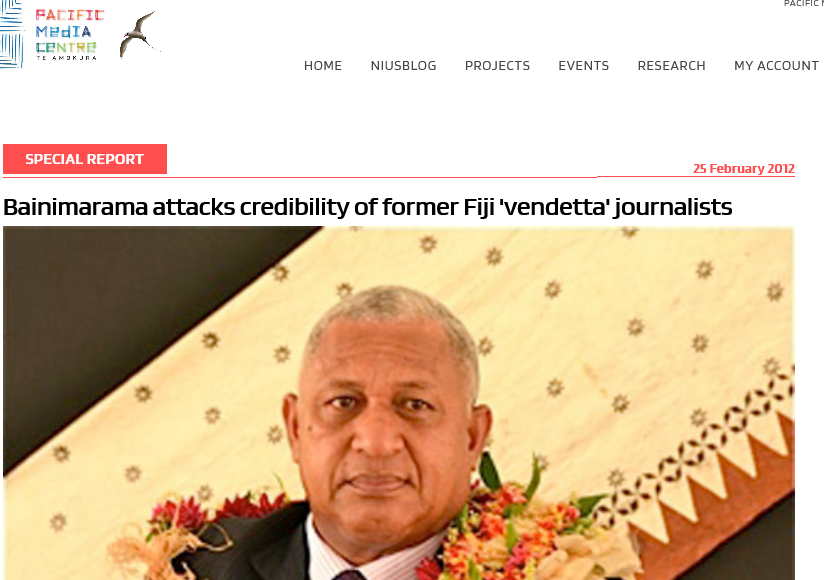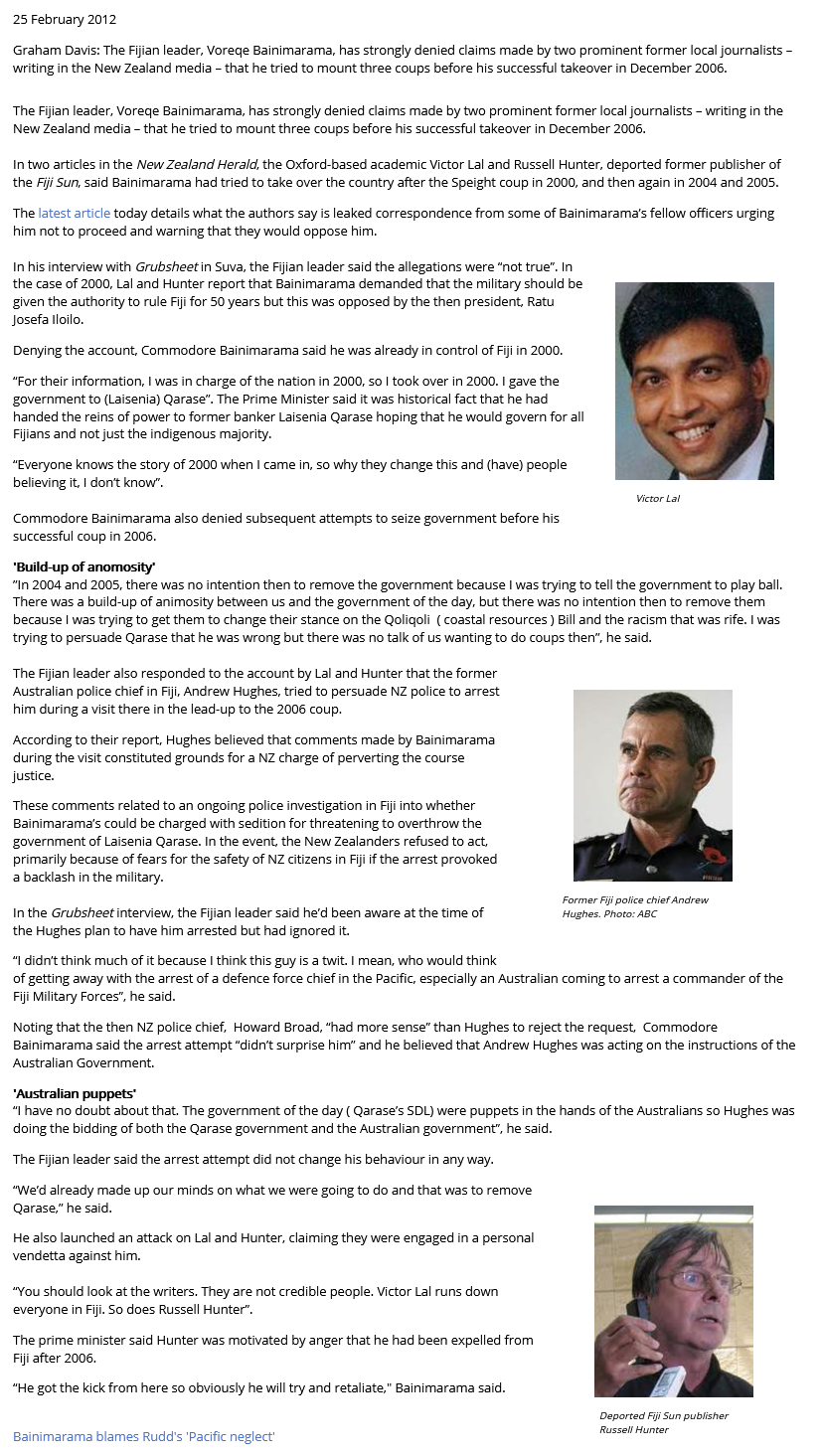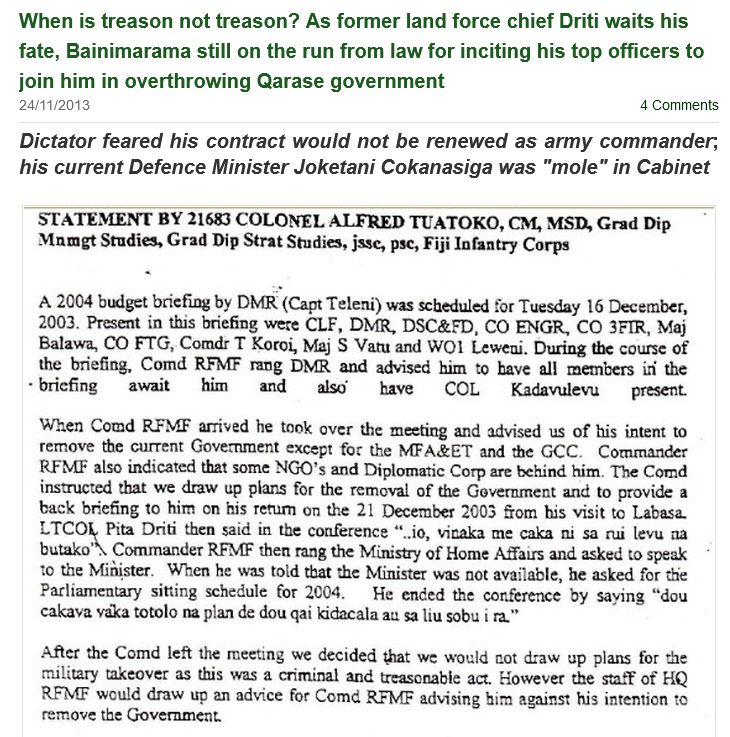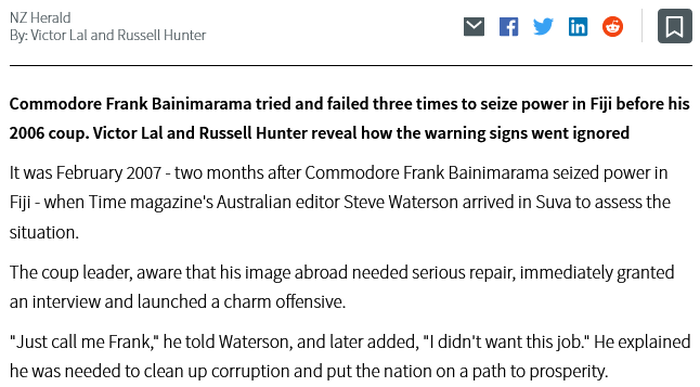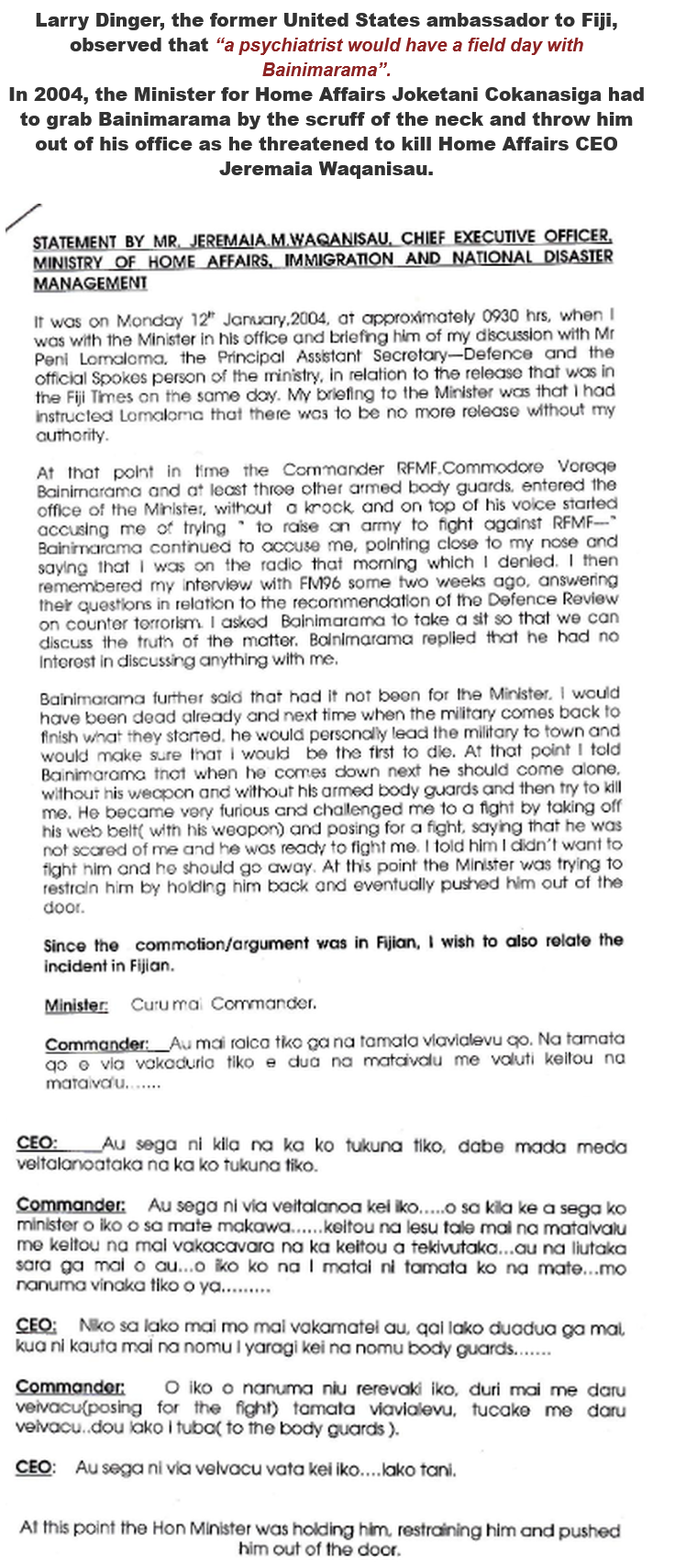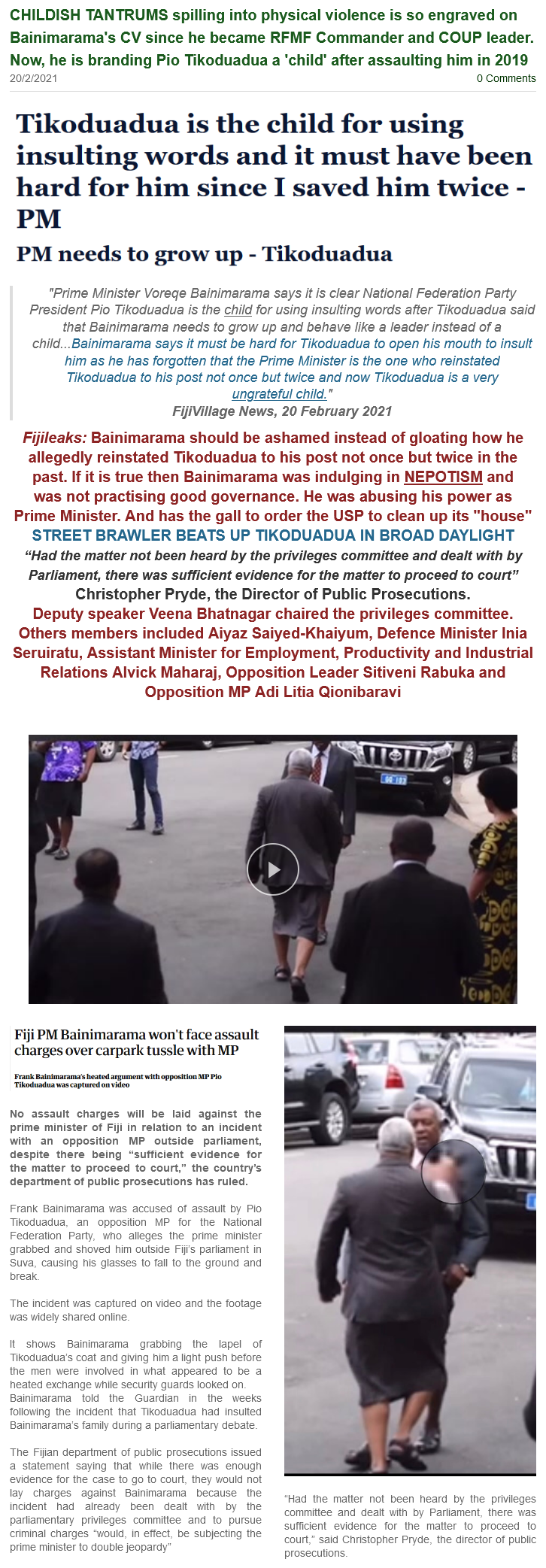DEAFNING SILENCE: Where is that NZ High Commissioner and FFP "Ba** Greaser" JONATHAN CURR who gave $4million of New Zealand taxpayers money for the Draft Fiji Police Bill?
By: Russell Hunter and Victor Lal, The New Zealand Herald, 17 February 2012
Fiji's chief of police made a private call to his New Zealand counterpart urging him to arrest Commodore Frank Bainimarama a few weeks before the military leader seized power in a coup in December 2006.
It was reported at the time that a request had been made through Interpol and rejected by the New Zealand Government but only now can details from behind the scenes be [re]vealed.
In November 2006 then Police Commissioner Howard Broad took the call from his Fiji counterpart Andrew Hughes, an Australian, who wanted to know if Commodore Bainimarama had committed any offence under New Zealand law for which he could be arrested.
Teams of police officers from both forces worked over a weekend and agreed the future dictator could be charged in New Zealand with perverting the course of justice in a foreign jurisdiction.
The planned charge related to remarks made by Commodore Bainimarama in New Zealand regarding an investigation into his alleged sedition in Fiji.
Mr Hughes sent two senior officers - an assistant commissioner and a senior detective - to New Zealand to liaise in the planned arrest.
"Then Howard Broad had a change of heart," said Mr Hughes. "He said New Zealand Foreign Affairs preferred a political solution.
"I argued it was his decision as Police Commissioner as to who should be charged in New Zealand."
At the time Commodore Bainimarama was in New Zealand for his granddaughter's christening and the Foreign Minister at the time, Winston Peters, had taken the opportunity to broker talks between him and elected Prime Minister Laisenia Qarase aimed at diverting Fiji's lurch towards a military takeover.
A day later, Mr Hughes received a call from Mr Broad.
"He sought my assurance that no NZ citizen would be endangered in Fiji as result of an arrest," said Mr Hughes.
"Of course I would do all in my power to protect all the people in Fiji but a blanket assurance of that kind was not possible. It would be like me asking him for a similar assurance covering all Fiji people in New Zealand. It wasn't possible to give him that.
"In the end, Mr Broad told me, 'Well, we're not going to arrest him."'
Mr Broad, now retired, told the Weekend Herald yesterday in a written statement that he remembered the call well.
"I remember it as a highly unusual request to consider an allegation against the Chief of Defence Force of a neighbouring country's properly constituted Government.
"I remember giving this decision a lot of consideration because it contained complex operational, legal and policy issues. I made the decision but I took a lot of advice. I remain comfortable with it."
He said some aspects of Mr Hughes' explanation did not accord with his recollection but he did not specify what they were.
In Suva, the Fiji police force had been awaiting an opportunity to arrest the commodore on the sedition charge but were unable to penetrate his heavily armed personal security detail - rarely less than 12-strong at any given time.
"I had earlier taken a brief of evidence to the DPP," said Mr Hughes, "and it was agreed that there was a case to answer on a sedition charge.
"We wanted to arrest and charge Commodore Bainimarama but he was permanently covered by heavy security. I was very keen to avoid an armed confrontation between the police and the military. So we waited."
As Prime Minister Qarase waited at Suva's Nausori airport to board a New Zealand Air Force VIP jet to take him to the Peters-brokered talks in Wellington, he was surprised to be joined by Mr Hughes, who then explained that the arrest plan was unlikely to come to fruition. Mr Qarase was shocked.
The Fiji Police Commissioner boarded the flight and in Wellington he met a deputy secretary for foreign affairs but was again told the New Zealand Government's position was that a political or diplomatic solution was preferred.
Aware that the police were ready to arrest him in Suva, Commodore Bainimarama had made it one of his many conditions for any settlement that the police commissioner would have to go.
Mr Hughes had, a week previously, sent his wife and sons to Australia having received credible information that they could be targeted by a military snatch squad.
In Wellington, he sought consular advice which was that he should not return to Fiji. He never did.
Mr Hughes also considered the safety of his own loyal officers who would try to protect him from military arrest.
The 2006 coup was the commodore's fourth attempt.
In 2000 during the negotiations that ended the Speight hostage crisis he suggested that the military should run the country for up to 50 years but Speight - and the president - would have none of it. In 2004 and again in 2005 he planned to take over the Government but his senior officers refused to commit treason.
All were sacked.
By December 2006 it was now or never for Commodore Bainimarama. It was widely agreed amongst informed observers of the events of 2006 in Fiji, including the diplomatic community, that without Commodore Bainimarama the RFMF would be rudderless.
Had Commodore Bainimarama been arrested in New Zealand the Fiji military would have been unable and unwilling to proceed with the removal of the Qarase Government.
The then US ambassador to Fiji, Larry Dinger, summed it up when he told his masters in Washington in a cable leaked by WikiLeaks regarding the New Zealand arrest plan.
"Being passive with bullies only encourages them. An arrest abroad might be the only way to enforce a criminal charge and remove the Bainimarama thorn," he reported.
Labour's foreign affairs spokesman Phil Goff, who did not deal with the issue, could not confirm Mr Hughes' account.
However, he could understand why no arrest was made, saying such a course of action would mean a country lost its credibility as a mediator for dealing with crises.
"I scarcely think you were going to lure a person here under false pretences only to arrest him. That would be seen as an ambush and bad faith and it wouldn't have resolved the situation within Fiji."
Fijileaks: The late Russell Hunter and Fijileaks Founding Editor-in-Chief had interviewed the late Andrew Hughes and the late Prime Minister Laisenia Qarase and other sources for the above article. We will reveal Hughes long letter requesting Broad to reconsdier his decision not to arrest the murder suspect Frank Bainimarama.
”In 2004 and 2005, there was no intention then to remove the government because I was trying to tell the government to play ball. There was a build-up of animosity between us and the government of the day, but there was no intention then to remove them because I was trying to get them to change their stance on the Qoliqoli ( coastal resources ) Bill and the racism that was rife. I was trying to persuade Qarase that he was wrong but there was no talk of us wanting to do coups then.”
Frank Bainimarama to Graham Davis, February 2012
Fijileaks: Bainimarama was lying, as documents on us contradict him
From Fijileaks Archive, 2013:
A series of documents smuggled out of Fiji tell a vastly different story. Bainimarama not only wanted the job but had tried three times previously to seize control of the nation.
His first attempt occurred during the negotiations to end the George Speight hostage crisis in August 2000. Several of those present confirmed that the Commodore - who had tacitly supported the Speight coup - declared that the military should lead the nation "for the next five, 10 or 50 years".
A heated argument between Speight and Bainimarama ensued, ending only when President Ratu Josefa Iloilo said a democratic solution was the only way forward.
Bainimarama proposed that banker and businessman Laisenia Qarase should lead an interim government with elections after one year. But to his frustration he found his "advice" to the interim government was routinely shunned.
By December 2003 the Qarase government - tired of the Commodore's constant and often public interference - was reluctant to renew his term, due to expire in April the following year.
When Bainimarama got wind of this, he flew into a rage and ordered his senior officers to start planning a coup. But he reckoned without senior officers who counselled against such action and finally refused to implement his orders.
On January 5, 2004, secret advice to Bainimarama not to stage a coup warned of the chaos and damage that could follow.
The document, composed and signed by Lieutenant Colonel Jeremaia Waqanisau, Colonel Alfred Tuatoko, Colonel George Kadavulevu, Colonel Samuela Raduva and naval commander Timoci Koroi, reads in part:
"We feel that the interests of the RFMF (Republic of Fiji Military Forces) and the nation have been overridden by your personal wishes ...
"Under the circumstances there is no way you can justify your intent and impending action. On the other hand the consequences of such action would be catastrophic for Fiji. The despair and suffering will be unbearable and longer lasting than that experienced after 1987 and 2000."
None of the officers agreed to be interviewed.
However, the later "redress of wrong petition" also contains a statement by Tuatoko, who wrote: "In my interview with [Bainimarama] he stated that he would forcefully remove the present government if his term as Comd RFMF was not renewed.
"I advised him that such an act was illegal and amounted to treason. I advised him that there are legal ways to settle his disagreement with government and that he must follow that legal path. Comd said that doing so would take too much time. He said that removing the government would be legally wrong but was morally correct."
This document was sent to the Minister for Home Affairs, Joketani Cokanasiga, and is likely to have been seen by Qarase. Incredibly, nothing was done. A senior minister told Hunter at the time: "We're not too worried about him [Bainimarama]. He doesn't have the support at the camp that he thinks he has."
The aborted coup of January 2004 persuaded the Government that the soldiers would not obey their commander if he ordered them to commit treason by removing it.
In December 2005, Bainimarama decided to try for a third time. He had been reappointed, so his job was no longer an issue, but he knew Police Commissioner Andrew Hughes had no intention of backing off a murder inquiry into the deaths of five members of the elite Counter Revolutionary Warfare unit, kicked to death by loyalist soldiers after the November 2000 mutiny.
There was also anger in sections of the officer corps (by now mostly hand-picked Bainimarama men) that the Qarase Government was "soft" on those involved in the 2000 coup.
Bainimarama had sacked the five officers who refused to carry out his first attempted coup and appointed Lieutenant Colonel Jone Baledrokadroka as Land Force Commander - effectively his deputy. He told Baledrokadroka to prepare plans for a military takeover.
Like his brother officers before him, JB (as he was known) refused to be involved in treason. He was told to take leave and not come back but again the coup had to be postponed.
JB told Hunter on the day of his dismissal: "I saw an order that I deciphered as treasonous and I could not accept it."
By May 2006, in the full realisation that Bainimarama's reappointment had not bought off its troublesome military commander and with a fresh election victory under its belt, the Cabinet wanted him gone.
There was talk of surcharging him for the blatant abuse of military funding in the army's "Truth and Justice" campaign that sought to influence voters during the 2006 election. It came to nothing - but Bainimarama was to hear of it and it fanned the flames of his fury.
With the dismissal of JB he was able to surround himself with an officer corps that owed their positions to him alone. His coup would take place within a year.
Claim strongman threatened to kill officer
Fiji leader Frank Bainimarama threatened to kill a former top army officer who challenged his 2003 coup plan, according to the officer's written testimony.
The late Lieutenant-Colonel Jeremaia Waqanisau refused to carry out the Commodore's coup order and took a new job as CEO at the Ministry of Home Affairs.
In a file note at the time he recalled in January 2004 the Commodore barged into Home Affairs Minister Joketani Cokanasiga's office with several bodyguards, accusing Waqanisau of raising an army against him.
"Bainimarama further said had it not been for the minister I would have been dead already, and next time the military came back to finish what they started he would personally lead [them] to town and make sure I would be the first to die.
"I told Bainimarama when he came down next time he should come alone, without his weapon and his armed body guards and then try to kill me. He became furious challenging me to a fight taking off his [weapon] and posing for a fight... I said I didn't want to fight him and he should go away. The minister was holding him back and eventually pushed him out the door."
His first attempt occurred during the negotiations to end the George Speight hostage crisis in August 2000. Several of those present confirmed that the Commodore - who had tacitly supported the Speight coup - declared that the military should lead the nation "for the next five, 10 or 50 years".
A heated argument between Speight and Bainimarama ensued, ending only when President Ratu Josefa Iloilo said a democratic solution was the only way forward.
Bainimarama proposed that banker and businessman Laisenia Qarase should lead an interim government with elections after one year. But to his frustration he found his "advice" to the interim government was routinely shunned.
By December 2003 the Qarase government - tired of the Commodore's constant and often public interference - was reluctant to renew his term, due to expire in April the following year.
When Bainimarama got wind of this, he flew into a rage and ordered his senior officers to start planning a coup. But he reckoned without senior officers who counselled against such action and finally refused to implement his orders.
On January 5, 2004, secret advice to Bainimarama not to stage a coup warned of the chaos and damage that could follow.
The document, composed and signed by Lieutenant Colonel Jeremaia Waqanisau, Colonel Alfred Tuatoko, Colonel George Kadavulevu, Colonel Samuela Raduva and naval commander Timoci Koroi, reads in part:
"We feel that the interests of the RFMF (Republic of Fiji Military Forces) and the nation have been overridden by your personal wishes ...
"Under the circumstances there is no way you can justify your intent and impending action. On the other hand the consequences of such action would be catastrophic for Fiji. The despair and suffering will be unbearable and longer lasting than that experienced after 1987 and 2000."
None of the officers agreed to be interviewed.
However, the later "redress of wrong petition" also contains a statement by Tuatoko, who wrote: "In my interview with [Bainimarama] he stated that he would forcefully remove the present government if his term as Comd RFMF was not renewed.
"I advised him that such an act was illegal and amounted to treason. I advised him that there are legal ways to settle his disagreement with government and that he must follow that legal path. Comd said that doing so would take too much time. He said that removing the government would be legally wrong but was morally correct."
This document was sent to the Minister for Home Affairs, Joketani Cokanasiga, and is likely to have been seen by Qarase. Incredibly, nothing was done. A senior minister told Hunter at the time: "We're not too worried about him [Bainimarama]. He doesn't have the support at the camp that he thinks he has."
The aborted coup of January 2004 persuaded the Government that the soldiers would not obey their commander if he ordered them to commit treason by removing it.
In December 2005, Bainimarama decided to try for a third time. He had been reappointed, so his job was no longer an issue, but he knew Police Commissioner Andrew Hughes had no intention of backing off a murder inquiry into the deaths of five members of the elite Counter Revolutionary Warfare unit, kicked to death by loyalist soldiers after the November 2000 mutiny.
There was also anger in sections of the officer corps (by now mostly hand-picked Bainimarama men) that the Qarase Government was "soft" on those involved in the 2000 coup.
Bainimarama had sacked the five officers who refused to carry out his first attempted coup and appointed Lieutenant Colonel Jone Baledrokadroka as Land Force Commander - effectively his deputy. He told Baledrokadroka to prepare plans for a military takeover.
Like his brother officers before him, JB (as he was known) refused to be involved in treason. He was told to take leave and not come back but again the coup had to be postponed.
JB told Hunter on the day of his dismissal: "I saw an order that I deciphered as treasonous and I could not accept it."
By May 2006, in the full realisation that Bainimarama's reappointment had not bought off its troublesome military commander and with a fresh election victory under its belt, the Cabinet wanted him gone.
There was talk of surcharging him for the blatant abuse of military funding in the army's "Truth and Justice" campaign that sought to influence voters during the 2006 election. It came to nothing - but Bainimarama was to hear of it and it fanned the flames of his fury.
With the dismissal of JB he was able to surround himself with an officer corps that owed their positions to him alone. His coup would take place within a year.
Claim strongman threatened to kill officer
Fiji leader Frank Bainimarama threatened to kill a former top army officer who challenged his 2003 coup plan, according to the officer's written testimony.
The late Lieutenant-Colonel Jeremaia Waqanisau refused to carry out the Commodore's coup order and took a new job as CEO at the Ministry of Home Affairs.
In a file note at the time he recalled in January 2004 the Commodore barged into Home Affairs Minister Joketani Cokanasiga's office with several bodyguards, accusing Waqanisau of raising an army against him.
"Bainimarama further said had it not been for the minister I would have been dead already, and next time the military came back to finish what they started he would personally lead [them] to town and make sure I would be the first to die.
"I told Bainimarama when he came down next time he should come alone, without his weapon and his armed body guards and then try to kill me. He became furious challenging me to a fight taking off his [weapon] and posing for a fight... I said I didn't want to fight him and he should go away. The minister was holding him back and eventually pushed him out the door."
